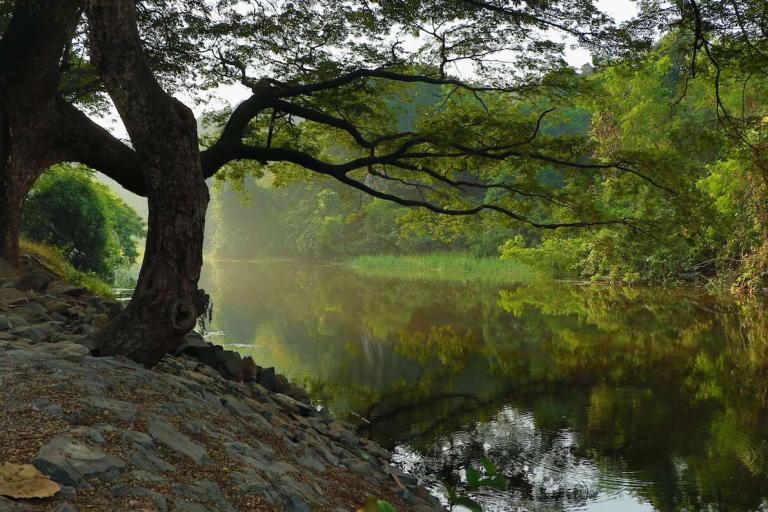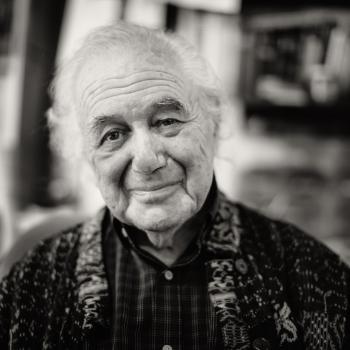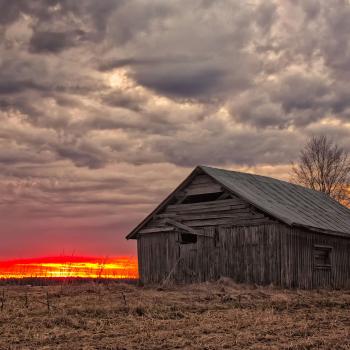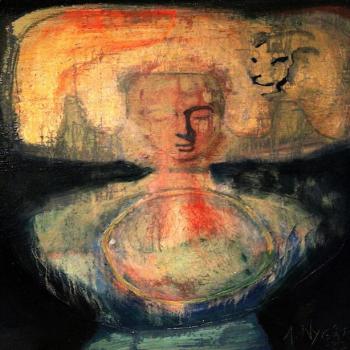Was humanity once more connected to God? As time has passed, has God become a lesser part of our collective lives? In the book Christian Meditation, James Finley tells a parable about how we first found God, and how, over time, we became disconnected from God. I’m going to paraphrase it here.
A long time ago, a woman felt called to leave her village, the only place she had ever known. She walked along the village’s main road, until she came upon a narrow path lined by brush and trees. The path beckoned her, and she followed it a long way until she came upon a river. She sat down on the banks of the river and let her feet drop into the water. She soon sensed this was not any river, for an overwhelming feeling of love and serenity swept over her. She had uncovered the essence of God.
Day after day she returned to river. Others from her village, wondering where she was going, soon followed her along the village road and down the narrow path, as well. They discovered the river too. Some chose to sit on its banks, but others immersed themselves in the river, drenching themselves in its revitalizing waters. The practice became known as river entering.
Soon a well-worn path began to form leading to the water’s edge, as more and more people began to enter the river. That’s when things began to change. Someone decided that to make things more orderly, people should get in lines to enter the river. Someone else observed that river entering was such a special act that there might be a ceremony for those doing it for the first time. Before long, there were rituals with hymns and candles.
Someone else observed that the river-entering was so important that a tent should be built over the path that led to the river. Not long after the tent went up, a fund-drive was held, and the tent was replaced by a large and beautiful building that towered over the path that led to the river.
Then, someone wrote a book titled The Meaning of the River and soon after there were more books on what entering the river meant. Not all the authors agreed with one another and before long there were so many books a library was built to hold them.
Over time, the powers that be decided there were experts on the river and these experts would be certified to teach others about the river. A school was built to promote the study of riverology and degrees were granted to certified riverologists. They held classes about the power and beauty of the river and how it changed lives.
Then someone opined that it was getting a little crowded by the river and it might be best if everyone did not enter the river, only the experts. They could then distribute the river water to others. And who was better suited to distribute the water than the riverologists who held degrees in river entering?
Soon, very few people went to the river. They were told about the river in ornate buildings, by certified teachers, reading from approved texts. And in time, even the riverologists began entering the water less and less. They hired someone to bottle the water and handed out bottles to those who sought them. Until almost everyone was content to sip bottled water, read books on river entering, attend river-entering ceremonies, and agree or disagree with each other about the meaning of entering the river.
Yet, occasionally someone would remembered there was another way, that the path to the river still existed. The trail was not as worn as it used to be. In fact, there were points where the trail disappeared altogether, and one had to proceed on instinct. But beyond the buildings, the path to the river still there—the same path the woman from the village had discovered so long ago.
These fortunate and wise few knew that all alone—with no building, no teaching, no ceremony—you could still find the river and immerse yourself in it. And while they were tempted to tell the others they were too far from the river to even get wet, they kept quiet. Because they also realized the only way to get to the path that led to the river, was to find it by yourself.
The path to “the river” still exists today.
The fact is there isn’t just one path to the river. There are many.
- You might find your path through a personal spiritual practice, perhaps by reading a book that touches your soul or through a meditation-like prayer.
- You might sense it over a cup of coffee while on your back porch at dawn or while on a morning jog in a tree-lined neighborhood or a yoga class with a talented instructor.
- You might feel it during any moment that brings you a sense of awe, which author Dacher Keltner defines as “the feeling of being in the presence of something vast that transcends your understanding of the world.”
James Finley, the original teller of the river entering story, says that on these special occasions “In a fleeting flash we realize there is nothing missing anymore. Our very life is manifesting the fullness of life itself.” It’s at these moments we realize we don’t need buildings, or teachings, or ceremonies to find the essence of God. We need only to look within ourselves.














